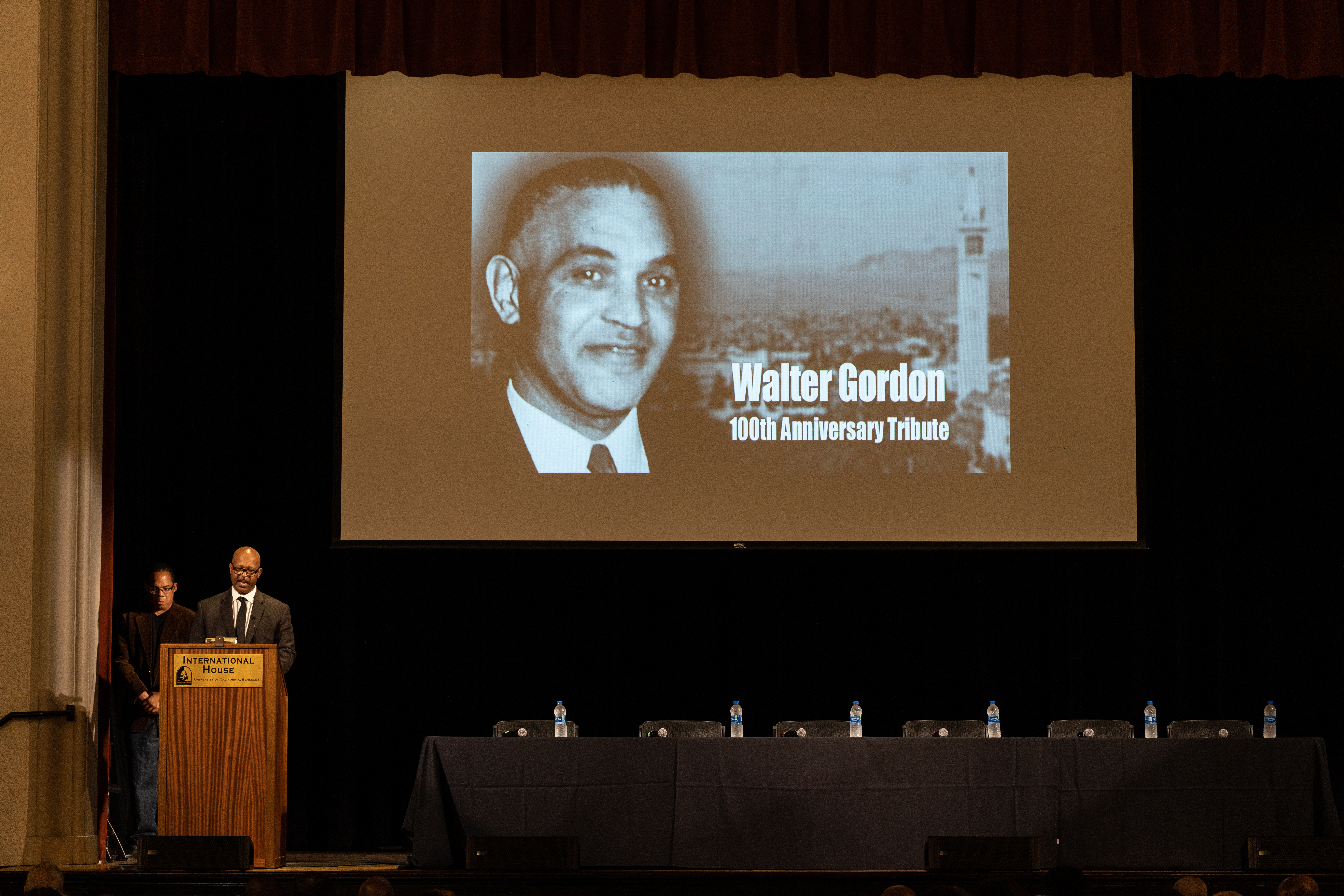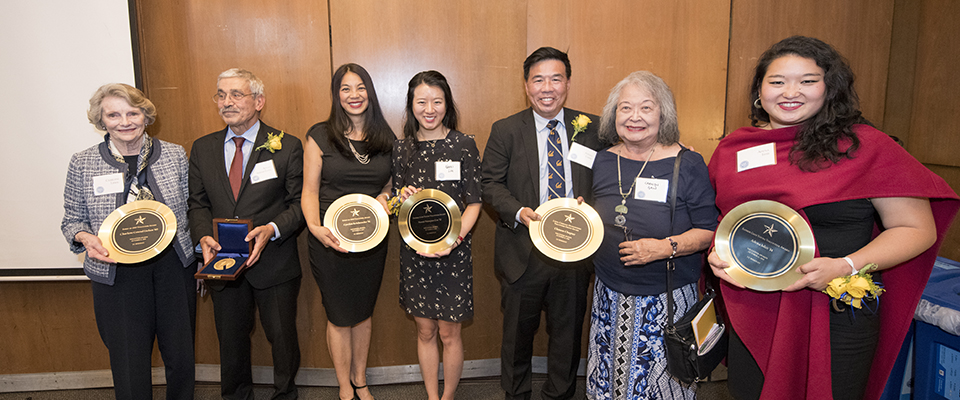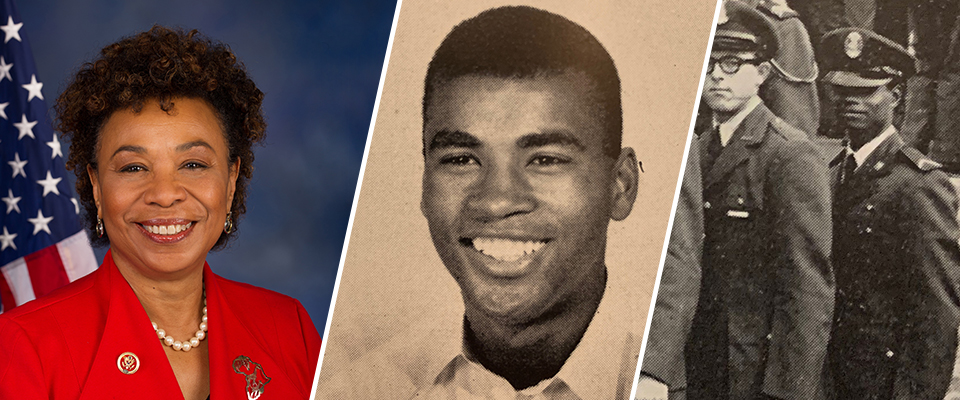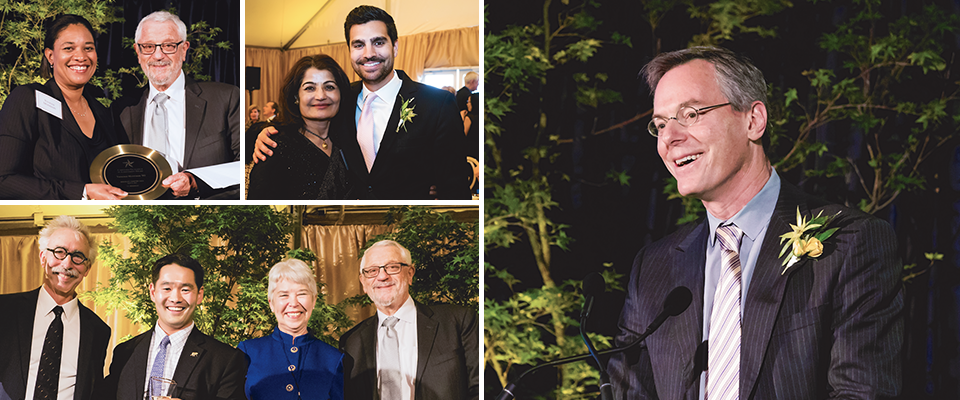The achievements of Cal alumni are not only impressive but also show current Cal students that it is possible to survive the rigorous UC Berkeley education and use it to make a difference in the world. For the aspiring scientists, there is Carol W. Greider Ph.D. ’87. For the up-and-coming jazz musician, there’s Vijay Iyer M.A. ’94, Ph.D. ’98. For the aspiring Olympian, there’s Natalie Coughlin ’05. And for students with other ambitions, there are a host of alumni who show as examples.
For Black students, there’s Walter Gordon.
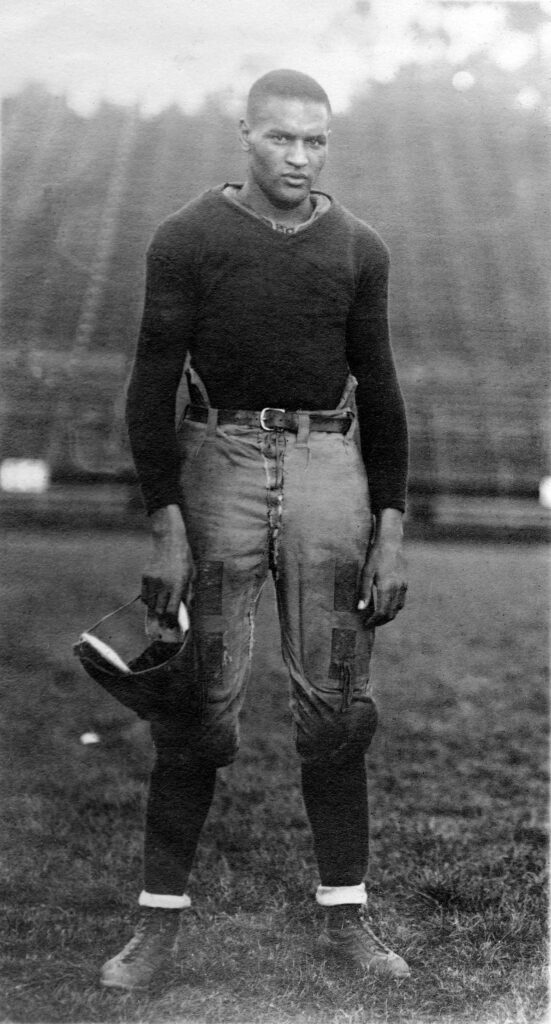
The life of Walter Gordon 1918, J.D. 1922 has been defined by the barriers he’s broken through and seeds he’s rooted for the futures that Cal students have now. He was a standout athlete, winning the California State Championship in wrestling and boxing and a star of the football team, becoming one of the first two African Americans named to the College All-American Football Team in 1918. He was a founding member of the Alpha Phi Alpha Fraternity, Incorporation, Alpha Epsilon chapter, chartered January 17, 1922. He was the first African American student to graduate from Berkeley Law (then known as the UC School of Jurisprudence).
After Cal, Gordon continued to make strides in politics, law enforcement, and government, becoming the first African American officer in the Berkeley Police Department, heading the Berkeley chapter of the NAACP, and eventually serving under appointment by President Dwight D. Eisenhower as Governor of the United States Virgin Islands in 1955.
For a time, Gordon’s accomplishments were quietly known in the Cal universe; his story was known by some, but remained untold for years. That changed last year with a 100-year anniversary celebration of Gordon’s graduation from Berkeley Law, held at International House. The celebration saw speeches from UC President Dr. Michael Drake, Chancellor Carol Christ, and Cal Athletics Director Jim Knowlton, amongst others who listed Gordon’s many accolades and achievements. The event was punctuated with a preview of filmmaker Doug Harris’ documentary All American: The Walter Gordon Story.

In the audience were Cal alumni, current students, friends, and members of Gordon’s family. There were people who knew Gordon’s story well, nodding their heads and vocalizing their agreements with sentiments made through the evening. There were students who seemingly didn’t know much but who were eager to learn of a groundbreaking person whose story hasn’t been widely told.
“Walter Gordon’s [story] has made up the sinew and the fabric of the University of California, Berkeley.”
Ahmad Anderson ’82, a member of Alpha Phi Alpha Fraternity Inc., Alpha Epsilon chapter and a Cal Football Hall of Famer
There was a panel discussion that included Ahmad Anderson ’82 of Alpha Phi Alpha Fraternity Inc., Alpha Epsilon chapter and Cal Football Hall of Famer. Cal Associate Athletics Director of Diversity, Equity, Inclusion, Belonging & Justice Dr. Ty-Ron Douglas and Walter Gordon’s grandson Ed Gordon were also in attendance to extol the importance of Gordon’s legacy.
The discussion was as much as a retrospective as it was old friends kicking back and sharing fond memories. Ed Gordon told stories of growing up under his grandfather’s tutelage, Douglas spoke about carrying Gordon’s legacy to continuing supporting and inspiring Black student-athletes, and Anderson told stories of growing up in Richmond with other Alpha men and Cal alumni who spoke of Gordon’s impact.
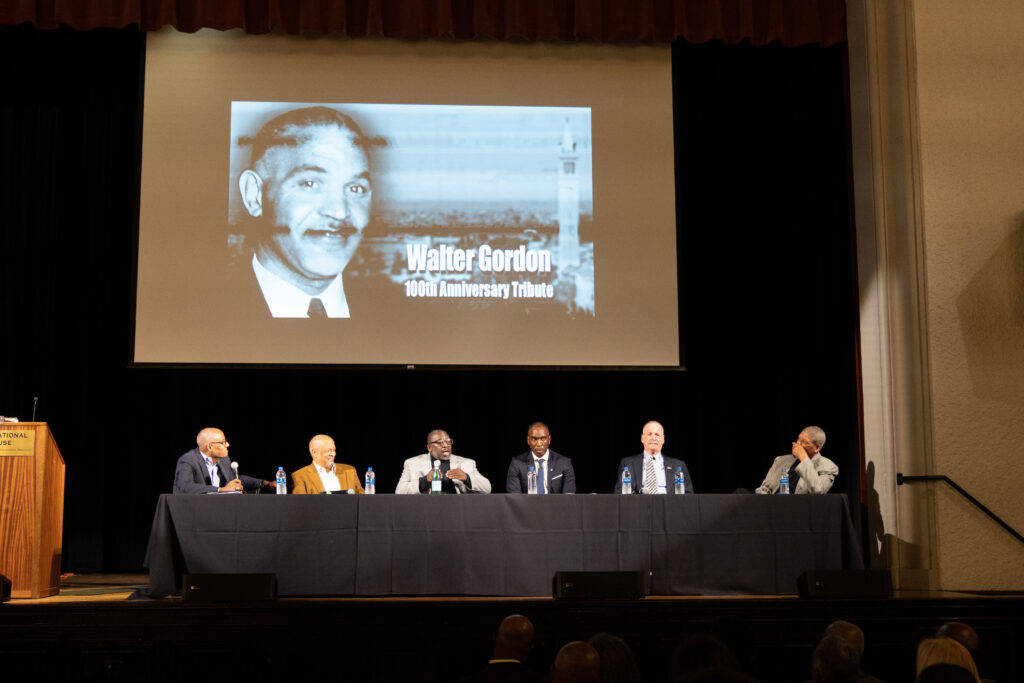
“I had a knowledge of Walter Gordon before I became an Alpha because of the many Black history stories that were told in my father’s living or in the church when the Alphas had meetings there,” says Ahmad Anderson. His father was the mayor of Richmond and member of the Alpha Epsilon chapter and bumped elbows with the likes of former Congressman Ron Dellums and former San Francisco Mayor Willie Brown. “It is not an uncommon story to know that Walter Gordon’s [story] has made up the sinew and the fabric of the University of California, Berkeley.”
He says the men he grew up around had the attributes and characteristics that Gordon had: dedicated to their studies, going above and beyond what was required of them, and service to their communities. “That’s what Walter Gordon was all about,” says Anderson.
He says Gordon embodied the freedom of speech and integration that Cal is known for, but “yet not the admiration and acclamation that he should receive through the process. How [can] you be at a university of over 20-some odd years and people don’t know?”
Former Executive Director of the Cal Alumni Association and Commissioner of the California Department of Financial Protection and Innovation Cloey Hewlett ’76, J.D. ’79 was also on hand to give remarks and stress the importance of knowing the stories of people who’ve opened doors for the students to come. “I looked at all those beautiful students who were really, really struggling, and many of them did not know the history of so many Black alumni that were pioneers [who were] going through the same exact things that they’re going through right now,” says Hewlett. “[These] stories need to be brought to them so they can stay strong in their journey as they break through barriers.”
Hewlett admits that she learned of Walter Gordon once while attending Cal, but didn’t know much. She was dogged about accomplishing the goals she set for herself, always facing forward and burying the not so pleasant history of black students at Cal. She even tried to tune out the hard moments she faced as a Black woman in the world.
“Sometimes we get so caught up in our own problems and our own challenges that sometimes we need to take time and reflect on history and appreciate the shoulders on which we stand.”
Cloey Hewlett ’76, J.D. ’79, Former Executive Director of the Cal Alumni Association and Commissioner of the California Department of Financial Protection and Innovation
“Most important and meaningful to me is that he was the first Black person to receive a J.D. from the Berkeley School of Law and also Berkeley’s first Black police officer,” she says, “That really touches my life because I was one of the first Black women District Attorney Investigators in the San Francisco District Attorney’s office.”
Commissioner Hewlett also served as the first Black Executive Director of the Alumni Association and helped create the African American Initiative Scholarship, which is funded by the San Francisco Foundation and in partnership with UC Berkeley and the Cal Alumni Association. The scholarship provides African American students with financial support to help make their UC Berkeley education more accessible.
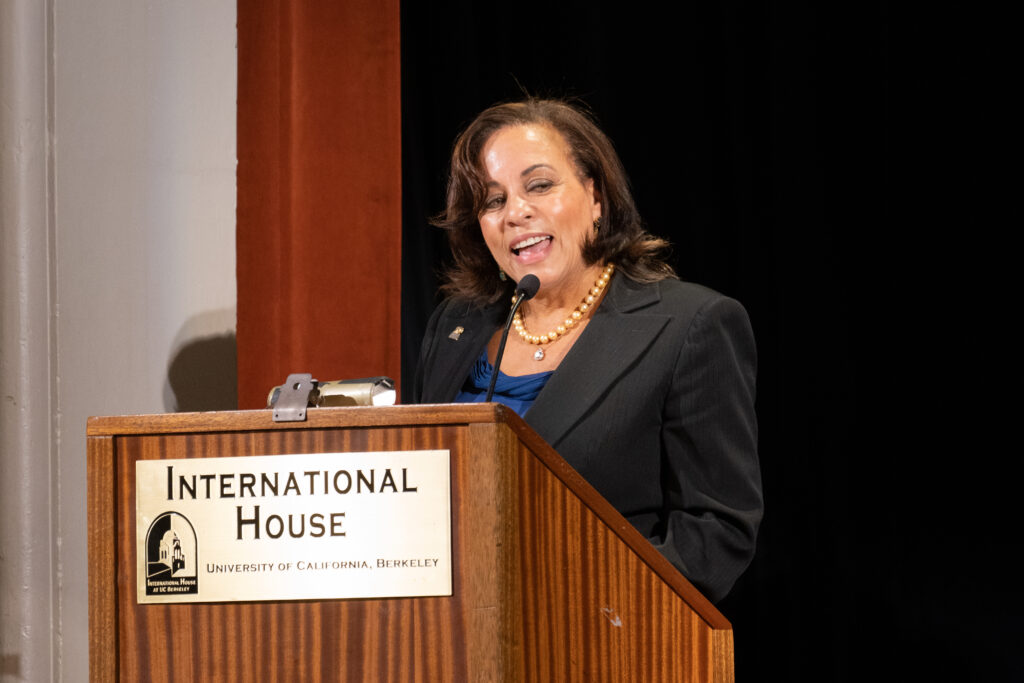
Commissioner Hewlett grew up during the civil rights era. Her first brushes with racial discrimination came when her family went to integrate a swimming pool. Her mother, who passed for white and allowed in, but she was denied entry. As a young girl, she didn’t understand, but the experience still lives with her. “I do remember the pain. That pain still lives with me,” says Hewlett. “I do remember the pain of sometimes being on that campus, even when I was an undergrad.”
“Sometimes we get so caught up in our own problems and our own challenges that sometimes we need to take time and reflect on history and appreciate the shoulders on which we stand, really appreciate and learn about it,” says Commissioner Hewlett.
As the many accomplishments of Walter Gordon were unveiled throughout the evening, Doug Harris’s documentary preview gave a taste to the difficult parts of Gordon’s history, but also the friends and allies who supported him. Jeffrey Warren, grandson of Earl Warren, former governor of California and Cal alum, spoke on the close relationship that Earl and Walter had.
“You…have to develop the courage and the strength to fight for your history,” says Hewlett, “it is the diversity of our country that has made us great, it is diversity that has made us great.”
All American: The Walter Gordon Story is being produced for broadcast on PBS through station partner KVIE Sacramento. Learn how you can financially support the completion of this project at dougharrismedia.com.






